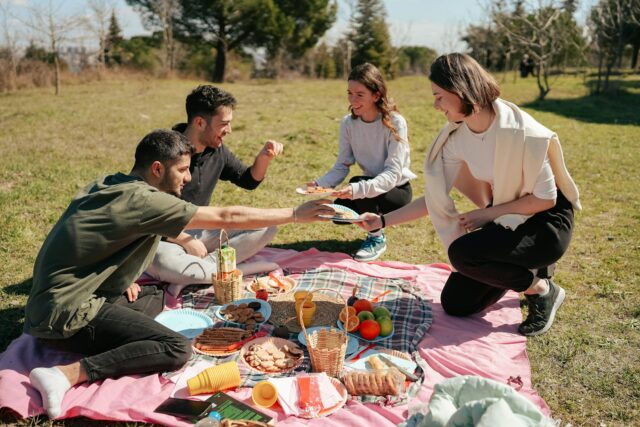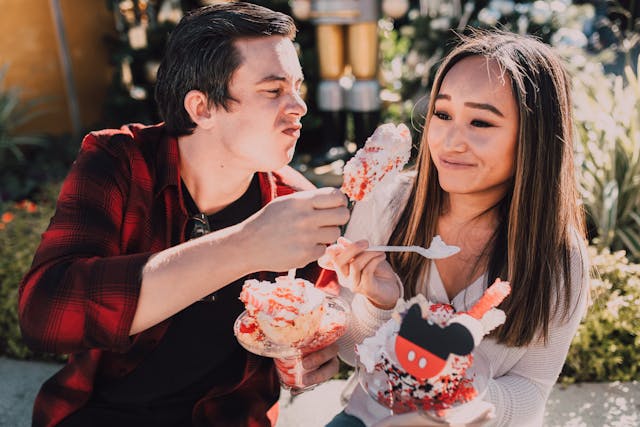Mixing friend groups can feel like trying to merge two completely different sitcom casts—some chaos, some awkward laughs, and the hope that it’ll all magically work.

Sometimes it clicks. Sometimes it makes you want to fake a phone call and leave your own party. If you’ve got work mates, old school friends, your partner’s crew, or a random collection of people who’ve never met, the idea of bringing them together can be exciting, or deeply nerve-wracking. Here’s how to do it without things getting weird or making you the unofficial social referee all night. It may not happen all the time, but it’s possible to have them get on well enough with some careful planning.
1. Know your why before mixing.
 Source: Unsplash
Source: Unsplash Before you throw everyone in a room together, ask yourself why you want to mix them. Is it convenience? A birthday? Do you think they’d genuinely get on? Having a clear reason helps you set the right tone and avoid forcing connections that aren’t really needed.
Some people mix groups just because they feel they “should,” but that can lead to unnecessary tension. If it’s just easier to keep some circles separate, that’s fine. Not every friend has to be friends with every other friend in your life.
2. Start small instead of going full party mode.

Trying to merge everyone at once can be a lot. It’s like speed dating with too much background noise. If you’re nervous about clashing personalities, try introducing a few people at a time in low-pressure settings like coffee or a casual pub hangout. This gives people more room to actually connect instead of just sharing small talk over blaring music. Smaller groups are also easier to read—if the vibe’s off, you can pivot before things get awkward on a bigger scale.
3. Give people a heads-up.

No one likes being surprised with a totally unfamiliar social group when they expected a chill catch-up. If you’re inviting someone to a group setting with people they don’t know, tell them in advance who’ll be there. This gives your friends a chance to mentally prep—and maybe even look forward to meeting someone new. A bit of context can go a long way in avoiding awkwardness or that classic “I don’t know anyone here” freeze.
4. Consider all the different personalities and vibes.

Some groups are full of big energy, while others are more introverted or low-key. If you know certain people might clash or dominate the space, think twice about mixing them, or be ready to manage the balance. It doesn’t mean your friends aren’t great individually. They just might not bring out the best in each other. Be mindful of pairing energy types that complement rather than overwhelm or drown each other out.
5. Find a shared activity to focus on.

When people don’t know each other, having something to do makes everything easier. A shared activity—board games, karaoke, cooking, a quiz—can create natural talking points without the pressure of constant conversation. Even something as simple as a walk, a film night, or making cocktails together can pull the focus away from ice-breaking small talk and give people something to bond over without it feeling forced.
6. Avoid inside jokes that exclude people.

If you’ve got years of shared jokes with one group, it’s easy to fall into that pattern without realising other people feel left out. It’s not intentional—it’s just muscle memory—but it can make new people feel like outsiders. Try to be aware of when conversations are turning into “you had to be there” territory, and bring things back into the present so everyone feels included. Little things like catching other people up or changing the topic can make a big difference.
7. Don’t put pressure on everyone to become best mates.

It’s lovely when people from different areas of your life hit it off, but it doesn’t always happen. Some connections take time—or might just stay surface level, and that’s completely fine. Take the pressure off. You’re not running a social experiment. If everyone’s polite and vaguely enjoying themselves, that’s already a win. Anything beyond that is a bonus, not a requirement.
8. Play host, but don’t micromanage.

It’s tempting to constantly check if everyone’s mingling or getting along, but hovering too much can make you feel more like an event organiser than a friend. You don’t have to control every interaction. Introduce people, keep an eye out for anyone who looks left out, but then let the night flow. If you’re calm and enjoying yourself, people are more likely to relax and settle into the vibe naturally.
9. Respect if someone’s not into it.

Not everyone enjoys group hangs, especially with strangers. Some people might say no to your invite or leave early, and it’s not personal. They just know their limits or social capacity for the day. If a friend prefers to stay in their comfort zone, let that be okay. Pushing too hard to make people mix can backfire and make things more uncomfortable than they need to be.
10. Don’t overshare on someone else’s behalf.

Sometimes when we’re trying to build bridges between people, we start sharing stories to connect the dots. But blurting out details someone shared with you privately—even if it’s funny or well-meaning—can cross boundaries fast. Let your friends introduce themselves in their own way and time. Oversharing might feel like a shortcut, but it can come off as invasive or make someone feel like their story isn’t theirs anymore.
11. Check in with people afterwards.

If you’re unsure how it went, don’t just guess—ask. A quick check-in like “How was that for you?” or “Did you get on with so-and-so?” can give you insight into how people felt about the mix. You’ll get a sense of who enjoyed it, who maybe didn’t vibe as well, and whether it’s worth doing again. Feedback helps you plan better for the future and shows you actually care about how everyone felt.
12. Remember, you’re the link, not the glue.

You don’t have to hold every conversation together or make everyone bond perfectly. If you’ve brought people together and they had a decent time, that’s enough. Friend groups can overlap without fully merging. Sometimes the best outcome is just that everyone had a chill time, even if no new lifelong friendships were formed. You’re allowed to be the connector without being the constant bridge between every interaction.




